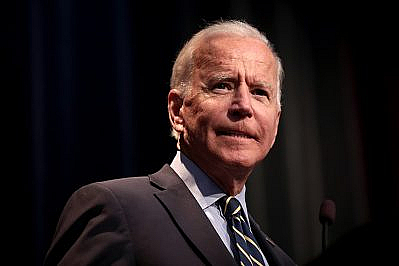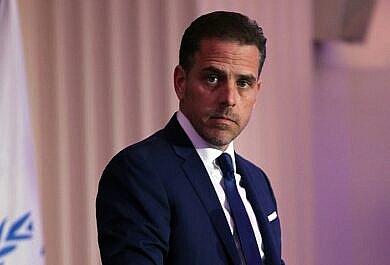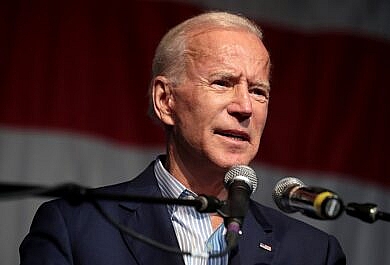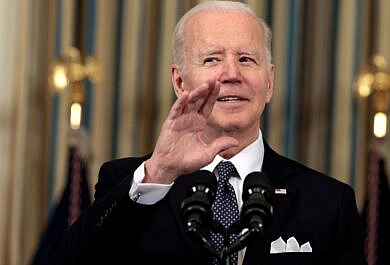Spangld read the new bombshell book about President Joe Biden so you don’t have to.
Summary
President Joe Biden is the subject of The Last Politician, a new book by Franklin Foer that chronicles the first two years of Biden’s presidency. The book offers insights into the inner workings of the Biden White House and has already earned headlines from outlets across the political spectrum. From angry outbursts at staff and foreign leaders to revelations about Biden’s deep-seated insecurities and resentments towards Barack Obama, here’s the top ten takeaways from The Last Politician:
10. There has been a quiet progressive takeover of the Biden administration.
The book details the leftward ideological evolutions of not just Biden but his top team. Chief of Staff Ron Klain’s journey left after the Obama years is documented in detail, as is that of National Security Adviser Jake Sullivan (“the old person’s idea of a young man”). Klain and Sullivan became loud internal voices for progressive policies. They worked to cozy up to the labor unions, court left-wing intellectuals and seed ex-Elizabeth Warren staffers throughout the administration. One could be forgiven for forgetting that the moderate candidate won the 2020 Democratic primaries.
9. President Biden, Mastermind? Or is it Dr. Jill?
Foer portrays the president as a man with a “grand strategy,” a man who Secretary of Transportation Pete Buttigieg claims has “pattern recognition,” or the ability to “make a flash judgment about every number that slid across his desk,” deducing whether “a proposal contained promise—and when it was a dead end.” Foer’s Biden is like the famous SNL sketch about President Ronald Reagan, appearing docile in public while cannily plotting behind the scenes.
Foer reveals the degree of influence Jill Biden had over her husband’s Cabinet picks. She vetoed Biden’s initial list of nominees for Secretary of Education for being too pro-charter schools and the only person she “greeted with enthusiasm,” Miguel Cardona, eventually got the job.
8. Biden’s relationship with Zelensky and the Ukrainians is rockier than it publicly appears.
Ukrainian President Volodymyr Zelensky told his aides he thought Biden was “weak” and felt as if Biden had “crushed” Ukraine by lifting sanctions on the Russo-German Nord Stream 2 pipeline. Zelensky allied with Sen. Ted Cruz (R-TX) to impose leverage on Biden, a move his staff thought “reeked of…amateurism” and was an indication of his “unseriousness.” Even pro-Ukraine voices in the Biden White House thought Zelensky “bombed” his first White House visit, and the meeting reportedly “pissed Biden off.”
Biden thought little of his Ukrainian counterpart – as Foer points out, “It was a strange fact: Biden had been deeply involved in Ukrainian politics longer than Zelensky.” The Ukrainians remained in denial about Russia’s planned invasion until literally the day before Russian troops marched across their borders. “You’d love nothing more than to draw us into World War III,” Biden told Zelensky on one call.
7. Kamala Harris is the afterthought of the administration.
Although Biden said publicly he wanted to treat Harris with the respect he believed Obama hadn’t given him, he refused to give her a portfolio similar to what Obama had given him – in short: “Biden didn’t need Harris in the same way Obama needed Biden.” Biden would even joke that Dr. Anthony Fauci should sit in the Vice President’s chair at meetings of his Covid team.
Then-White House Chief of Staff Ron Klain reportedly thought Harris made “life excessively difficult by imposing all sorts of constraints on herself.” Harris didn’t want to work on women or race-related issues, she wanted a majority-female staff, a black female chief of staff, and to oversee the Scandinavia portfolio, of all things. She became known for her “rabbit ears” for criticism, reacting to each perceived slight or critical story.
Biden’s promise of weekly lunches fell by the wayside, but he didn’t hesitate to bestow upon her some of the downsides of being veep. Some of Biden’s aides thought his decision to delegate the Central America brief to Harris was “sadistic” or a “hazing ritual” as Obama had once dumped that issue on Biden’s lap.
6. Biden has deep-seated insecurities and resents Barack Obama.
Biden’s insecurities are manifest in Foer’s account. Biden thinks experts who speak in jargon are trying to “use their academic lingo to belittle him.” He “craved” the respect of ex-Treasury Secretary Larry Summers, whose warnings about inflation he ignored with disastrous effects. Yet despite his desire for Summers’ respect, Biden “couldn’t help but imagine that Summers would always consider him an intellectual inferior.”
Not only did Biden ignore Summers’ inflation warnings, Foer reports – he called Summers personally to yell at him and put him “in his place.” Biden was similarly brusque with Democrats’ other inflation Cassandra, West Virginia Sen. Joe Manchin. “Joe, if you don’t come along, you’re really fucking me. I need you on this,” Biden told Manchin when he balked at Biden’s American Rescue Plan over spending concerns. “Find your way to yes on this.”
Foer contrasts Biden, “the politician,” with his two “outsider” predecessors, Barack Obama and Donald Trump. The impact of Obama’s disdain for his former running-mate on Biden’s psyche – and how it contributed to the massive chip on the octogenarian’s shoulder – permeates the book.
Biden reportedly told aides that “Obama didn’t know how to say fuck you properly,” and the way he pronounced it was “how they must curse in the ivory tower.” He thought Obama “negotiated with himself” on the 2009 stimulus and as a result didn’t spend the amount that Biden thought was necessary to pull the country out of the Great Recession.
5. Despite the negative headlines that have followed its publication, this was not intended to be an anti-Biden book.
Author Franklin Foer is upfront about the “respect” he has for Biden, although he began the book viewing him as “a bloviator who dangerously fetishized bipartisanship.” The former editor of the New Republic, the liberal Foer consistently gives Biden and his staff the benefit of the doubt while often assuming bad motives from most Republicans. For example, he views Biden’s refusal to apologize for the Afghanistan withdrawal as a sign of “patience, born of experience” as “he stubbornly owned the decision that scarred his legacy. The author tends to wedge in non-sequiturs that flatter liberal pieties like “The reality of the pandemic was race” or the Inflation Reduction Act was an “was an investment in moral authority.”
Foer contradicts himself frequently. He tries to claim that public discontent with the teachers unions for refusing to reopen schools was limited to “upper-middle-class neighborhoods” and “newspaper columnists and television hosts” literally one paragraph before describing the “despair” of Chicago’s immigrant children who had been kept out of school. He wrote about Biden’s “infinite reserves of compassion” before literally one clause later making it clear that his compassion only applied selectively to those “with whom he felt a connection.” In other words, finite.
Both the Biden team and Foer struggle to move beyond partisanship and acknowledge the successes of the Trump administration. Operation Warp Speed, the “one Trump decision that receives universal praise” was “tainted by the fact that it emerged from the Trump regime” in the eyes of Biden’s top COVID officials to the point that they officially decided to stop using the name. Foer criticized Operation Warp Speed for “playing favorites” and “enmeshing itself so deeply in industry,” yet just 36 pages earlier praised the Biden administration for passing a legislative program where the federal government would “function as an investment bank, spending money to catalyze favored industries to realize his vision, where the United States controls the commanding heights of the economy of the future.”
Foer consistently gives Biden the benefit of the doubt. He characterizes Biden’s infamous 1987 plagiarism incident that derailed his 1988 presidential campaign as “inadvertent,” despite Biden’s well-documented history of plagiarism. “A good Biden story often gets better with time,” Foer writes, which is a very forgiving way of saying “Biden lies often.” Foer gives away his conclusion in the introduction, predicting that Biden will be remembered as “unheroic but honorably human…the old hack who could.”
4. The 80-year-old president can’t help showing his age.
Biden’s age manifested itself in several ways throughout the book – most colorfully in his anecdotes about long-dead leaders from decades past. Biden described himself as a protégé of Sens. Mike Mansfield and Hubert Humphrey. The fact that Biden is old enough to make this claim about Humphrey, Lyndon Johnson’s vice president and the Democratic nominee for president in 1968, and Mansfield, the Senate Majority Leader from 1961-1977, before Ron DeSantis was born, is remarkable in and of itself. Biden’s generational gap with the rest of his team was stark – he was old enough to have met with then-Israeli Prime Minister Golda Meir in 1973 just before the Yom Kippur War broke out.
Foer doesn’t attribute Biden’s lack of press conferences to his age, however. Instead, it was “his indiscipline and imprecision” that got him in trouble. Even so, Biden chalks his low approval ratings up to “a failure of the media, which somehow neglected to note all the ways in which his administration was superior to Trump’s.”
3. Biden can’t control his temper.
A recurring theme of the book is Biden’s explosions of anger. His “angry moods” made meetings “uncomfortable” for his staff. He was furious when he learned the 100-day deportation moratorium he promised on the campaign trail would include “fentanyl dealers, sex offenders, and other felons.”
When HHS Secretary Xavier Becerra balked at his agency taking in more unaccompanied minor children, Biden threatened to fire him and insisted he do so. Even under a direct order, Becerra only begrudgingly accepted the responsibility and seemingly did not make the welfare of those children a priority for HHS. More than 85,000 unaccompanied minors placed in the care of HHS are now reportedly unaccounted for.
In another incident, Biden attempted to arm-twist Rep. Stephanie Murphy (D-FL), the daughter of Vietnamese refugees who fled after the collapse of South Vietnam, into supporting Build Back Better at the same time bodies were falling from the skies in Kabul. Biden told her “If you’re not with me, you’re the opposition.” Murphy, already angry about Afghanistan, hung up on the president.
2. Biden has an incredibly high opinion of his own talents and abilities.
Biden’s high sense of self-regard was another recurring theme in the book. Biden’s aides learned not to debate him on legislative strategy as Biden considers himself to be “his own best tactician.” He told his staff he didn’t think any Republicans “fathomed their own political interests” for not agreeing right off the bat with his vision of an infrastructure deal. Later, he blurted out a number Sinema told him in confidence, infuriating her and nearly scuttling his domestic legislative agenda.
The president also considered himself to be “the business” when it came to foreign policy and carried himself with a “swaggering sense of his own wisdom” on international relations. Biden became determined to “succeed where Obama failed” and not let the generals “jam him” like he thought they did to his old boss.
1. Biden’s temper and arrogance contributed directly to the disastrous withdrawal from Afghanistan.
Afghanistan crystalized Biden’s arrogance. On three separate occasions between 2002 and 2009, Biden exploded in anger at top Afghan officials and nearly caused diplomatic incidents. These three encounters contributed to Biden having a “fuck-this-shit” moment where he decided to push for an American withdrawal from Afghanistan, no matter the cost.
Biden’s generals warned him before the withdrawal that Kabul could fall to the Taliban and urged him to maintain a 2,500 to 4,000-troop contingent to avoid handing Afghanistan back to the terrorists America had expelled from power two decades before. Gen. Mark Milley warned of the fate of women and girls if the Taliban returned, but their welfare was only “tangential” in the considerations. Even European allies like Germany opposed the pullout over these human rights concerns.
Biden was unmoved by the arguments in opposition. As Biden said on Face the Nation in 2020, he felt “zero responsibility” for the consequences that would follow an American withdrawal. The military tried to warn Biden of the consequences. The political appointees breezed by the military’s concerns. As Deputy Secretary of State Brian McKeon smarmily told one general, “We at State have a higher tolerance of risk than you do.”
Foer recounts a moment when Biden lashed out at the parent of one of the Marines killed in the suicide bombing of Abbey Gate during Biden’s chaotic Afghanistan withdrawal. “Don’t you ever forget that name. Don’t you ever forget that face. Don’t you ever forget the names of the other twelve. And take some time to learn their stories,” Mark Schmitz, father of Jared Schmitz, told Biden. “I do know those stories,” Biden, who is widely praised in the media and in this book for his “empathy,” snapped back at the grieving father. As he left the tarmac at Dover Air Force Base, the sister of one of the dead screamed at Biden, “I hope you burn in hell. That was my brother.”
© Dominic Moore, 2023







1 comments On Angry Outbursts, Deep-Seated Insecurities and Hidden Ukraine Tensions: 10 Takeaways from the Bombshell Biden Book
Oh, he’ll burn in hell alright.
Comments are closed.